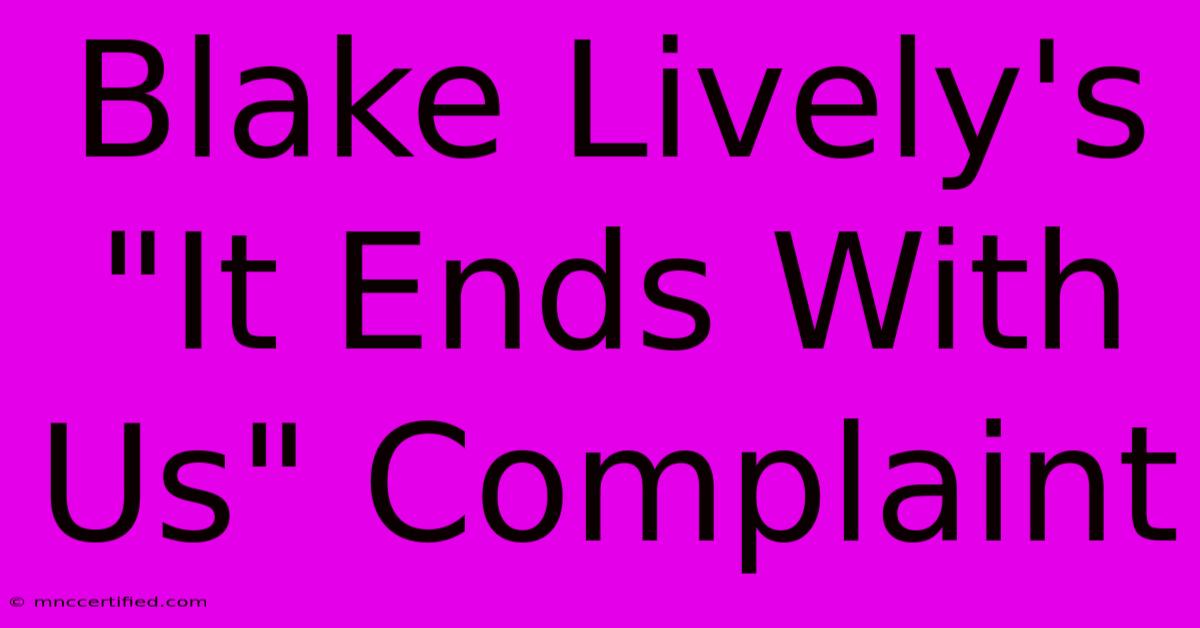Blake Lively's "It Ends With Us" Complaint

Table of Contents
Blake Lively's "It Ends With Us" Complaint: A Deeper Look at the Controversy
Blake Lively's recent comments regarding Colleen Hoover's wildly popular novel, "It Ends With Us," have sparked a significant online debate. While the actress hasn't issued a formal "complaint" per se, her expressed concerns have ignited discussions about the portrayal of domestic abuse and the book's overall impact on readers. This article will delve into Lively's perspective, the ensuing controversy, and the broader conversation surrounding the representation of abusive relationships in literature.
What Did Blake Lively Say?
While there isn't a single, easily quotable "complaint" from Blake Lively, her sentiments have been interpreted by many as critical of the novel's romanticized depiction of an abusive relationship. Her comments, shared through various platforms and interpreted by fans and media outlets, suggested discomfort with the way the book normalizes or even glorifies aspects of a toxic relationship. The exact phrasing and context may vary depending on the source, but the core message remains consistent: Lively expressed concern over its potentially harmful impact, especially on young, impressionable readers.
The Controversy: Romanticizing Abuse?
The heart of the controversy lies in the interpretation of Colleen Hoover's portrayal of Ryle Kincaid, the abusive protagonist in "It Ends With Us." Many readers, including Lively, argue that the novel's narrative, while intending to highlight the complexities of abuse, inadvertently romanticizes Ryle's character and his actions. This romanticization, critics contend, can be detrimental, potentially minimizing the severity of abuse and blurring the lines between healthy and unhealthy relationships for vulnerable readers.
Key Arguments Against the Book:
- Normalization of Abuse: The book's portrayal of Ryle, even amidst his abusive behavior, can unintentionally normalize such actions. The inclusion of romantic moments alongside abusive ones can create a skewed perception of what constitutes a healthy relationship.
- Glamorization of the Abuser: Some argue that Ryle’s attractiveness and charm are used to downplay the seriousness of his actions, making it harder for readers to recognize the warning signs of abuse in real-life scenarios.
- Triggering Content: For survivors of domestic abuse, the book's content can be extremely triggering and retraumatizing.
The Defense of "It Ends With Us":
Despite the criticism, "It Ends With Us" maintains a massive and devoted readership. Many argue that Hoover's intention was to shed light on the realities of abusive relationships, not to glorify them. The book's popularity stems from its relatability and the emotional journey it takes readers on. Defenders argue that:
- It Starts a Conversation: The novel initiates crucial conversations about domestic abuse and its long-term effects. This dialogue, although potentially uncomfortable, can be essential in raising awareness.
- Complex Characters: The portrayal of both Ryle and Lily (the protagonist) are complex and nuanced, reflecting the multifaceted nature of abusive relationships.
- Not a How-To Guide: The book is not intended as a manual for abusive relationships, but as a story that aims to show the devastating consequences of such dynamics.
The Larger Conversation: Responsible Representation of Abuse
Blake Lively's concerns highlight a larger and vitally important conversation: how do we responsibly represent domestic abuse in literature and media? It's crucial to ensure that narratives of abuse avoid unintentionally glamorizing or minimizing the violence involved. A balance must be struck between raising awareness and avoiding the potential for harm to vulnerable audiences.
Moving Forward:
The debate sparked by Lively's comments compels a more critical engagement with the portrayal of abuse in popular culture. Writers, publishers, and readers should work together to ensure that stories about abuse prioritize the well-being and safety of survivors, fostering empathy and understanding without inadvertently normalizing harmful behaviors.
This discussion is ongoing and complex, requiring sensitivity and nuanced understanding from all sides. The goal isn't to condemn or censor, but to foster a more responsible and impactful portrayal of domestic abuse in storytelling.
Keywords: Blake Lively, It Ends With Us, Colleen Hoover, domestic abuse, book controversy, romanticizing abuse, literary representation, toxic relationships, abusive relationships, trigger warning, controversial books, book review, reading discussion, popular novels.

Thank you for visiting our website wich cover about Blake Lively's "It Ends With Us" Complaint. We hope the information provided has been useful to you. Feel free to contact us if you have any questions or need further assistance. See you next time and dont miss to bookmark.
Featured Posts
-
Watch Brentford Vs Nottingham Forest Live
Dec 22, 2024
-
Mahomes Superhuman Performance Again
Dec 22, 2024
-
Kellys First Game A Promising Start
Dec 22, 2024
-
Dundee Defeat Rangers Rise Clement Focused
Dec 22, 2024
-
Atletico Tops La Liga After Barca Defeat
Dec 22, 2024